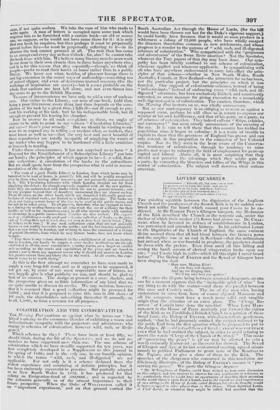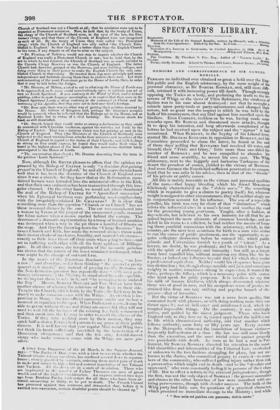LOVERS' QUARRELS.
" Friends all, but now—even now In quarter and in term like bride and
Divesting them for bed; and then, but Low, (As if some plaLet had nuwitted men.) Soon:, at and tilting at each other's broaA la opposition bloody:'' Tom existing squabble between the dignitaries of the Anglican Church and the presbyters of the Scotch Kirk is in its sudden out- break not unlike the brawl which caused poor Cassia to be ca- shiered. At Sir ROBERT PEEL'S Glasgow banquet, the Moderator of the Kirk described the Church as the majestic oak, under the shelter of which their modest (?) flower had grown up. Dr. CHAL- MERS, when he lectured in defence of establishments in London, was patronized and attended by bishops. In his celebrated Letter to the Dignitaries of the Church of England, the same eminent divine assured them that all bad blood between the Geneva gown and the surplice was at an end in Scotland—that the millennium had arrived, when. as was foretold in prophecy, the presbyter should lie down with the prelate. Even from amid all this billing and cooing the harsh scream of clerical vituperation broke upon our ear ; " and Casio high in oath—which till this night I nevef heard before." The Bishop of EXETER and the Synod of Glasgow have been singing the duet
How now, Madam Flirt !
It you thus will chatter, And are for flinging dirt,
We'll try who best can spatter.- Of course the dispute being between reverend clergymen, no one can for a moment suppose that the " invincible spirit of wine " has any thing to do with the matter—and there the parallel between this case and Cassitis ends. The ire of the men who, having undertaken to serve God, have of course abjured .Mammon and all his compeers, must have a much more solid and tangible origin than the stimulus of au extra glass. The " Clergy Re- serves " of Canada have done the mischief. When Lord HAD- DINGTON in the Douse of Peers modestly put forward the claims of the Kirk as an Established British Church to a portion of these broad lands, the Bishop of EXETER, with charaeteristie gentleness, replied, " that he had purposely omitted the subject retbrred to by the noble Earl from the first question which he proposed to put to the Judges. He eorthl mit call them a. t'hurch : AND IT WAS roll PEACE SAKE that lie 11,11 omitted the subject, in order to avoid refusing to insert the words Clergy of the Church of Scotland.'" This mode of "preserving the peace" is (if we may be allowed to coin a word) eminently Exeter-ish : as the event has showed. The Synod of Glasgow and Ayr, at its last semi-annual meeting, agreed unani- mously to petition Parliament to grant none of the Reserves to the Papists, and to give a share of them to the Kirk. The speeches of the clergymen who concurred in this resolution are felicitously illustrative of the Bishop Of EXETER'S success iu "pre- serving the pence." We quote the Glosper Arius- " Mr. Al•Naughtan, of Paisley, could have wished to hear sonic discussion on this sleet, and was anxious to express his own S011tillienti, in reference to it ; particu ally that he might have an opportunity of directing thew attention to the insult thrown upon their Church, and to the impodenee and impertinence of 11101 sitting in the House of Lords. caned Bishops, but who, he thought, would be better occupied in other piaces than in that House. These Spiritual Lords, or Ciril Lords, or whatever they might be called, had asserted that the Church of Scotland was not a Church at all ; that its ministers were not to be regarded as Protestant ministers. Now, he held that, by the treaty of Union, the clergy of the Church of Scotland were, in the eyes of the law, the Pro- testant clergy, and that those of the Church of England were not recognized as such at all. By the treaty of Union they were called the Protestant clergy,' while the Church of England was only called 'the Church Esta- blished in England.' So that they had a better claim than the English Church to the term, if any dispute at all was to arise on the subject.
"Dr. Fleming, of Neilston, would not stop to inquire whether the Church of England was really a Protestant Church or not ; but he held that, by the act to which he had referred, the Church of Scotland was as 'ouch entitled to the Canada Clergy Reserves us was the Church of England. The latter Church had, however, grasped ut the Reserves, and were building colleges, and doing every thing in their power to make the English Church the only esta- blished Church hi that colony. He trusted there was inure principle and more independence and fortitude among them than to yield to those men. Let their understanding of the word Protestant go to the Rouse of Lords, then, in order that it may be laid before the Judges.
"Mr. Duncan, of Milton, wished to ash in what way the I louse all' Lords was to be approached, as lie never could conscientiously mg."' 10 whlrcss any set of men as Lords Spiritual. It was contrary to dm 1Vord God, and a virtual yielding, either to make lanyuage meaningless, or to C0/71i SS timt there were in the Church Spiritual Lords, a thing contrary to the enntmowl of Christ and the testimony f his Apostles, that they were not to lord over God's heritage. "Mr. Rose said, there was no other way of getting their petition received by the House. \1r. Gibson of Kingston said, perhaps Mr. Duncan's scruples would he removkth when he reflected that the Bishops sat in the House, not as Spiritual Lords, but in virtue of a civil lordship. Mr. Duncan shook his head, as still dissatisfied.
"Dr. Smyth hoped they would make as strong a declaration as they could do consistent with Christian meekness, against the ductriae set forth by the Bishop of Exeter. That was a doctrine which was fast gainhcz gr-uud in the ,Church of England. They (the Ministers of the Church of Scotland) were subjected to the most contumelious attacks from ministers oral members of the Church of England in regard to the status of their Church ; mid with feelings as strong as they could express, lie hoped they would make their voice be heard in the highest places of the land against the monsteous doctrine lately promulgated in the House of Lords.
"'fhe conversation then closed ; Mr. Duncan dissenting from the term in the petition Lords Spiritual. "
Now, although Dr. SMYTH pleases to affirm that the opinion ex- pressed by the Bishop of EXETER is only "a doctrine fiat gaining ground in the Church of England," he and all his copresbyters know well that it has been the doctrine of the Church of England ever since it was a church for they know that at the Reformation, unor- dained laymen were intruded into the ministerial office in the Kirk,
and that their own ordination has been transmitted through this irre-
gular channel. On the other hand, we would ask where slumbered the zeal of the Bishop of EXETER for " Apostolical succession" when his Episcopal brethren were performing send-surplice-duty with the irregularly-ordeined Dr. CIL%1.MERS? It is clear that something more than the question "Church or no Church" has set • these reverend divines by the ears. The cat metamorphosed into a woman by Venus at the prayer of the enamoured youth, resumed her feline nature when a mouse rustled behind the curtain. The decorum of a dramatic rcTrosentation by a troop of learned monkies was destroyed when a wag in the pit threw a handful of filberts on the stage. And thus the throwing down the "Clergy Reserves" be- tween Church and Kirk, has made the reverend divines throw aside their decent cloaks of meekness, humility, and mutual ferbearanee- exactly as little Lots throw off their coats when g,,ing to box—and set to buffeting each other with all the lusty epithe:e of Billings- gate. In all these cases, the temptation of the fa:(utrite pehetion has shown that the nature of the beast remained tmehanged, what- ever might be the change of outward form.
In the words of the il:ustrious Bombastes Ferio,o, " we love a row :" and therefitte, so 11.r from thinking " the querrel a pretty quarrel as it steeds," met instead of preying fee thi• .s.,./..m«it on the Non-Intrusion question has repeatedly dote. " neeet peti- tionary velamence,") the :\ linistry to stand aloof fro e tie:itediblie we do implore them to mia in it, awl "by aseueeies, neore miffed the fray." Mesers. Roniener STEuAwr and Fos Ski he have here another chance of winning the ministers of the lin k to their side. To spite the Church, which holds Ira the Torii., the Kirk may be in- duced to melee common ceuse with the Whigs. An clie tion is im- pending in Moray : the tits official canvassers ought not to lose a moment in repairing to the :-pot. When Parliament meets, it may be able to get on without them; and Willey arc succes.tid, they will not need to wait till the liminess of the evening hes !hilly commenced and then sneak into the 1,•!,rary in order to avoid do: cheers of the Tories. If' they take tee,hing more by their motion, they may catch half-a-dozen Letabe-hed parsons to say grace at their public dinners. It is well known that your regular linistetial Whig does not think Ids broth sufficiently sanctified by the Inmedietion of a Dissenting clergyman ; awl that the few stra.. Establishment clergy who make common cause with the \Vhigs are mere pis- alters.
A letter from Dam aSells, Of the 24 March, in the ,s'nors../ Journal, says—" The Nebo if Dan...setts, with a view to Lew. min whether the Talmud ordain Inlimm sacrifices, has confined se% eral Jews in separate house., closely sentinels, ordering them under pain sit' death to make and suhmit to him a full and correct translation of the Talmud into Turkish. All tlm Jews are in a state of desolation. Those who are implicated in the mimic]. of Father Thomas,' are men of great wealth and of the highest consideration. An express arrived two days ago from Ibrahim Pacha, w itlt orders for all those who have been ar- rested, amounting to thirty, to he put to death. The French Consul has protested against this sentence, and demanded that, before it is carried into execution, certain doubtful points should be cleared up."



























 Previous page
Previous page